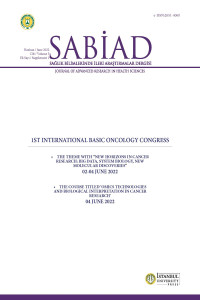DETERMINATION OF THE THERAPEUTIC EFFECT OF VULPINIC ACID AND VULPINIC ACID-RESPONSIVE miR-197-3P IN BREAST CANCER TREATMENT BY IN VITRO AND IN VIVO STUDIES
Abstract
Breast cancer is the most common type of cancer in women and an effective treatment method has not been developed yet. Researchers are working on alternative treatment options that do not have toxic side effects based on the patient’s resistance to chemotherapeutics over time. Our study revealed molecular characterization and in vivo experimental studies of vulpinic acid and vulpinic acid-responsive miRNAs on breast cancer. miRNAs formed by the application of vulpinic acid on breast cancer and normal cells were determined by microarray analysis. The genes and pathway analyses targeted by miRNAs were determined using bioinformatics tools. As a result of the bioinformatic analysis, it was determined that miR-197-3p was associated with breast cancer. The anti-proliferative activity of miR-197-3p responsive to vulpinic acid was determined in MCF-7 breast cancer and MCF-12A cells. Peptide identification was performed to evaluate the effect of vulpinic acid-responsive miR-197-3p at the proteome level, and the relationship between target proteins was determined using bioinformatics tools. A xenograft breast cancer model was used to understand the in vivo effects of vulpinic acid and miR- 197-3p on breast cancer. The obtained results revealed the effect of vulpinic acid-responsive miR-197-3p on the development of breast cancer and strengthened the possibility of an alternative treatment method in the future. With the data obtained, the effect of vulpinic acid-responsive miR-197-3p in breast cancer treatment was determined for the first time and presented to the literature and the pharmaceutical industry as an effective, reliable, and cost-effective treatment approach.
References
- Grozescu T, Popa F. Prostate cancer between prognosis and adequate/proper therapy. J Med Life. 2017;10(1):5-12
DETERMINATION OF THE THERAPEUTIC EFFECT OF VULPINIC ACID AND VULPINIC ACID-RESPONSIVE miR-197-3P IN BREAST CANCER TREATMENT BY IN VITRO AND IN VIVO STUDIES
Abstract
Breast cancer is the most common type of cancer in women and an effective treatment method has not been developed yet. Researchers are working on
alternative treatment options that do not have toxic side effects based on the patient’s resistance to chemotherapeutics over time. Our study revealed
molecular characterization and in vivo experimental studies of vulpinic acid and vulpinic acid-responsive miRNAs on breast cancer. miRNAs formed by the
application of vulpinic acid on breast cancer and normal cells were determined by microarray analysis. The genes and pathway analyses targeted by
miRNAs were determined using bioinformatics tools. As a result of the bioinformatic analysis, it was determined that miR-197-3p was associated with
breast cancer. The anti-proliferative activity of miR-197-3p responsive to vulpinic acid was determined in MCF-7 breast cancer and MCF-12A cells. Peptide
identification was performed to evaluate the effect of vulpinic acid-responsive miR-197-3p at the proteome level, and the relationship between target
proteins was determined using bioinformatics tools. A xenograft breast cancer model was used to understand the in vivo effects of vulpinic acid and miR-
197-3p on breast cancer. The obtained results revealed the effect of vulpinic acid-responsive miR-197-3p on the development of breast cancer and
strengthened the possibility of an alternative treatment method in the future. With the data obtained, the effect of vulpinic acid-responsive miR-197-3p
in breast cancer treatment was determined for the first time and presented to the literature and the pharmaceutical industry as an effective, reliable, and
cost-effective treatment approach.
References
- Grozescu T, Popa F. Prostate cancer between prognosis and adequate/proper therapy. J Med Life. 2017;10(1):5-12
Details
| Primary Language | Turkish |
|---|---|
| Subjects | Clinical Sciences |
| Journal Section | Meeting Abstract |
| Authors | |
| Publication Date | August 9, 2022 |
| Submission Date | June 28, 2022 |
| Published in Issue | Year 2022 Volume: 5 Issue: S-1 |

